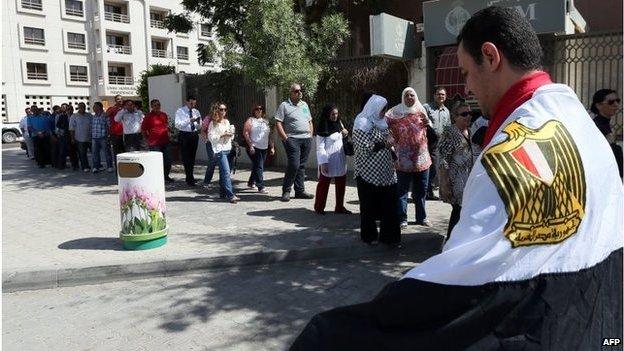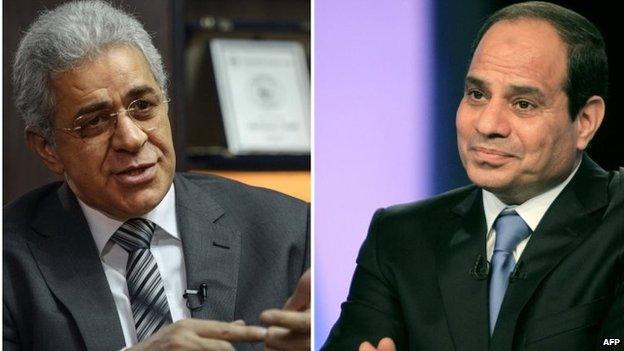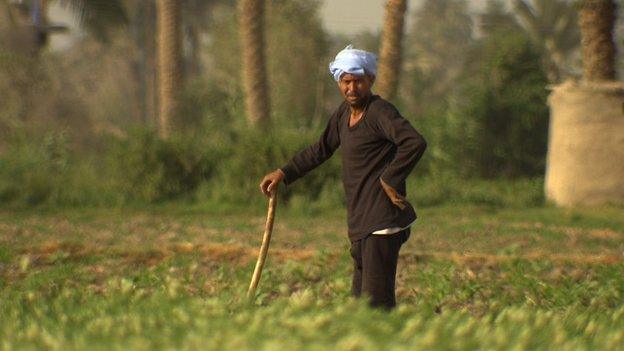Egyptians set sights on new leader to cure chronic woes
- Published

The economy, security and personal freedoms are key issues for Egyptian voters
Egyptians vote on Monday and Tuesday to elect a new president, for the second time in two years. The front-runner is the retired army chief, Abdul Fattah al-Sisi, who ousted the Islamist President, Mohammed Morsi, last July, as the BBC's Cairo correspondent Orla Guerin reports.
At an open-air rally in Cairo, an adoring crowd sang, danced, and cheered in support of Abdul Fattah al-Sisi.
For several hours they waved Egyptian flags, and posters of their hero. On the packed platform, the dignitaries included Muslim and Christian leaders, top actors and actresses, and celebrated singers. But there was one notable absentee - the candidate.
In this election campaign the front-runner has not made a single public appearance, apparently because of fears for his life.
He has limited himself to carefully choreographed interviews, and indoor meetings with handpicked groups. And he kept his election platform secret for most of the campaign on the grounds of "national security".
The recently retired army chief can afford this novel approach.

Hamdeen Sabahi (left) has been trailing far behind Abdul Fattah al-Sisi in the polls
Less than a year after Mr Sisi removed the elected President, Mohammed Morsi - following massive public protests - he looks certain to replace him. While opponents say he staged a coup, supporters revere him for ending the Brotherhood's divisive rule.
Sayed Ahmed Ab Al Aal stood out from the crowd at the rally, with a Koran in one hand, a cross in the other, and a toy tank taped to his head. "The Brotherhood injured my eye with birdshot, " he said. "But I will support Sisi even if I walk blind in the street. I can't live without him."
Many see the pious 59-year-old as a kind of Egyptian superman.
"I want Sisi to be president for so many reasons," said Goma Abu Masalam, proudly wearing a Sisi badge. "He protects us. He will save the economy. He will restore security and safety."
As well as having strong public support, Mr Sisi is backed by the institutions of state. That makes for an unfair fight, according to his lone challenger, the left-wing politician Hamdeen Sabahi. He came third in the last presidential vote in 2012.
The charismatic former political prisoner, also aged 59, is appearing at all his own rallies, calling for democracy and social justice.
Many see him as a champion of the poor. When we caught up with him in the city of Banha, he said his campaign had faced many problems, but he could not stay on the sidelines waiting for an ideal contest.
"It isn't fair, but I have been involved with elections since I was a student," he told us. "To get a real democracy in this country, we have to fight, to capture a piece of democracy."
'People are exhausted'
But away from the campaign trail, democracy is not the main concern for many.
More than a quarter of Egyptians live below the poverty line - most in rural areas. The political upheavals of recent years haven't changed much for them.
And they have a long list of problems for Egypt's next president.

Many Egyptians face a daily struggle to get basic services like water and electricity
We found examples at a carpenter's workshop in the village of al-Gharaq, two-and-half hours from the capital.
The business is run in a breezeblock shed, with reeds for a roof. It stands as a monument to Egypt's stuttering economy. Power cuts usually cause a standstill for a few hours a day. At the time of our visit, there had been no running water for four days.
The workers said life was worse now than a decade ago.
"There are shortages of petrol and gas," said 50-year-old Magdi, whose weary face was streaked with dust. "We have to travel long distances and we usually can't find transport. There are sewage problems, and the people can't find bread to eat."
His colleague Imad, 27, said he could not afford to marry and saw no point in going to the polls. "There is nothing available so why should we vote for anyone?" he asked. "There's no hope for anyone here. People are exhausted."
A short drive away, in the city of Fayyum, we watched a nightly ritual - Islamists protesting against the president-in-waiting.
About 150 people marched through the back streets. Many made the four-fingered salute which shows solidarity with Mohammed Morsi and his now-banned Brotherhood. Women in headscarves leaned out from their balconies, echoing the gesture.
In recent months more than 1,000 protesters have been killed in Egypt - most of them Islamists. Up to 20,000 people have been detained.
Liberal icons of the revolution have been jailed, and peaceful protests have been effectively outlawed. As the most powerful figure in the current transitional government, Mr Sisi has presided over a brutal crackdown on dissent.
The Brotherhood and others expect the repression to get worse when he assumes the presidency.
Challenges ahead
There are plenty of causes for concern, according to a Western diplomat, who listed the banning of Islamist and secular groups, the excessive use of force, and the mass death sentences handed down recently to suspected Brotherhood protesters.
"Sisi wants international legitimacy," he said, "and he has an opportunity to set a different course after the election. But the omens are not encouraging."
For now, most Egyptians appear eager to embrace another pharaoh from the ranks of the military. But experts warn that Mr Sisi could be on the receiving end of fresh mass revolt if he cannot show tangible progress on the economy.
"Something has got to give, unless he does wonders with the economy, and that's extremely unlikely," said Dr HA Hellyer of the Brookings Institution. "You could be looking at an uprising in another year or two."
Asked about the struggle for democracy in Egypt, his response was swift and bleak. "It is in suspended animation," he said.